Teaching and young scientists were the focus of the first ever "Engineering Day", hosted by the Alliance of Thuringian Engineering Sciences on 23 June. The TU Ilmenau as host welcomed about 200 teachers, students, researchers from different disciplines of the participating alliance universities as well as representatives of the professional practice.
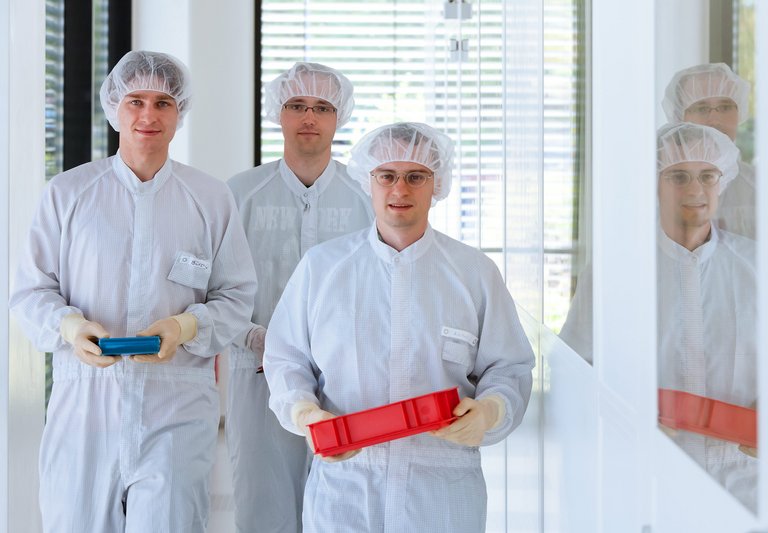
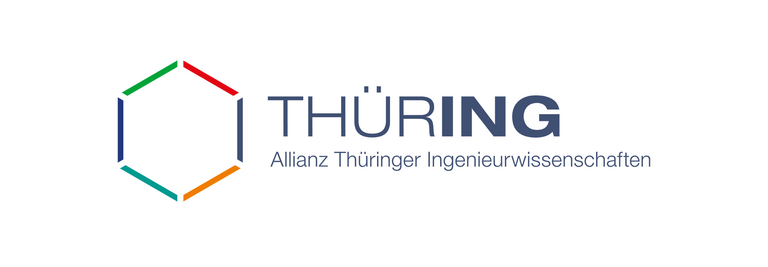
Engineering sciences are an important focus of Thuringia's higher education landscape. The proportion of students in this subject group in Thuringia is well above the national average at over 25 percent. In addition, the engineering sciences play a particularly important role in meeting the demand for skilled workers and collaborating with Thuringia's business community in the area of research and development. To strengthen engineering sciences in Thuringia, in 2019 the "THÜRING. Alliance Thuringian Engineering Sciences" was founded in 2019 to promote a structured and regular exchange on strategic developments in research, teaching and marketing between the participating universities, non-university research institutions and partners from industry. As one instrument in this context, the "Engineering Sciences Day" is to be established as an annual event in the future. TU Ilmenau has now kicked off the new series.
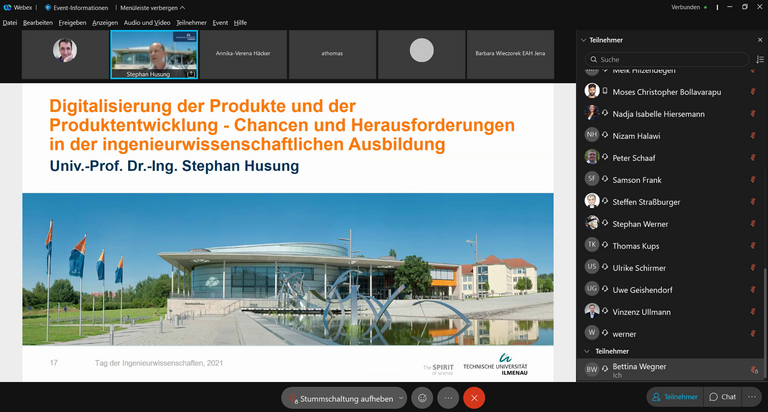
Exciting contributions on the future of academic teaching
The "Engineering Day" devoted the morning to the future of academic teaching in the engineering sciences, while the afternoon was reserved for young scientists and thus current research topics. After a video greeting by Carsten Feller, Thuringian State Secretary for Economy, Science and Digital Society, and the welcome of the guests by the Vice President for Studies and Teaching at TU Ilmenau, Professor Anja Geigenmüller, the first part of the program started with lectures by teachers. In his keynote speech, Prof. Stephan Husung, TU Ilmenau, addressed the opportunities and challenges for teaching in the context of the digitalization of products and product development. He pointed out that synergies in the teaching offered by Thuringian universities should be used and existing redundancies can be reduced. This is to be done jointly with Nordhausen University of Applied Sciences in an impulse project funded by the eTeach network.
Prof. Dr. Barbara Wieczorek, Ernst-Abbe-Hochschule Jena, presented a tool for the implementation of the so-called Constructive Alignmet under the topic "Event-oriented examination-relevant competences". The core of the concept is the alignment not only of teaching and learning methods, but also of forms of examination with the intended learning objectives. She showed that this tool can also be developed and used for existing courses. The feedback of the students to the tool is positive, the preparation of exams can be done more effectively with it.
Prof. Dr. Christian Koch from the Bauhaus University Weimar, gave an overview of the developments in the construction industry and the necessary further developments of the courses and teaching content with his lecture "Digitalization in the construction industry - What does this mean for training/teaching?". More interdisciplinary courses, group projects and changed forms of communication will be necessary, especially due to increasing digitalisation, and a research orientation in teaching will ensure that the latest findings are communicated.
The view from the practice was presented by Tobias Richardt, managing technical director of the company TECHNIK in FORM Blechbearbeitung GmbH and DESIGN in Form Fertigungstechnik GmbH. In response to the question "What knowledge should future employees have?", he reported that experience has shown that graduates bring very good technical knowledge with them when they start their careers and that they are able to apply this knowledge in practice. On the other hand, there is a need to catch up in terms of English language skills and soft skills, such as the ability to deal with conflict, criticism and communication. These should be more strongly reflected in academic training.
Engineers need problem-solving skills and the ability to think outside the boxI
The subsequent lively discussion among the participants showed that the TU Ilmenau had succeeded in presenting relevant topics on the future of teaching and studying in an exciting way. The managing lecturer of the Central Institute for Education at the TU Ilmenau, Dr. Claudia Haaßengier, who had moderated the morning programme, was pleased with the great response:
The different perspectives on engineering studies in Thuringia presented in the lectures highlighted the diversity of approaches, the resulting teaching offers and existing expertise. This was also made clear in the discussion. The focus was on technical competencies, which, however, should be accompanied by interdisciplinary competencies: Today's engineer works in interdisciplinary, possibly international teams, needs problem-solving skills and the ability to look beyond one's own nose.
The student perspective was also brought into the discussion, the digitalisation of the courses offered in the last semesters was just as much a topic as the desire for more practical projects, which are ideally interdisciplinary in nature.
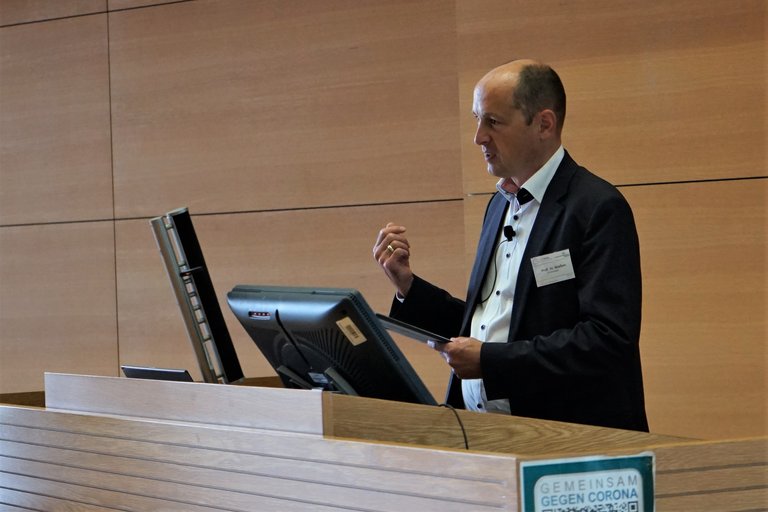
"Future - Innovation - Interdisciplinarity" - Thuringian young researchers presented projects.
The afternoon program was opened with a welcoming address by Prof. Winfried Speitkamp, spokesman for the board of directors of the Alliance of Thuringian Engineering Sciences, and with the motto "Future - Innovation - Interdisciplinarity" was entirely dedicated to young scientists. The keynote lecture was given by Prof. Stefan Niessen from Siemens AG and TU Darmstadt, on the future challenges of a sustainable energy supply. At the same time, the lecture fit in perfectly with the university's current theme year of energy. Prof. Niessen will also advise the Executive Board as a newly elected member of the University Council of TU Ilmenau.
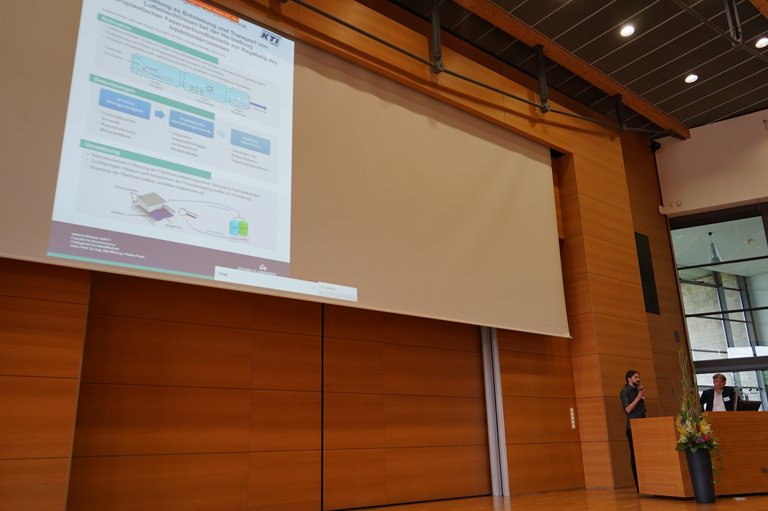
Wide range of research topics
After a short discussion round, the eagerly awaited poster competition of young scientists from several Thuringian universities started. The research topics presented in two panels, each with a pitch and a poster, ranged from different contributions on the topic of energy and electromobility to quality improvement in materials and the development of new materials to issues in the field of automation and AI. The Vice President for Research and Young Scientists at TU Ilmenau, Professor Stefan Sinzinger:
"We are pleased that a total of 30 doctoral students from almost all Alliance universities are participating with a contribution", "The wide range of their scientific work offers all interested parties from Thuringia's universities and beyond the opportunity to get to know the broad spectrum of engineering sciences in Thuringia and to exchange personal ideas.
Afternoon program in hybrid format
While the morning programme took place as a purely online event, the afternoon events were offered for the first time in an interactive hybrid format. This meant that participation was possible both by attending on site and online. Thus, the audience in the Audimax was able to experience the pitches partly in presence form and partly in video form. In addition to the short presentations, interested parties were able to find out more about the respective projects and establish contacts in poster sessions. They benefited from state-of-the-art video conferencing technology and wireless presentation systems in the seminar rooms of the Humboldt Building, which were purchased in 2021 with funds from the special fund "Hochschullehre-Digital-Extra II".
Best posters awarded
The crowning finale of the "Engineering Day" was the awarding of the three winning contributions, which had been chosen by the audience itself according to the criteria of quality of presentation and comprehensibility of the talk. The prizes for the best posters were donated by the Universitätsgesellschaft Ilmenau - Freunde, Förderer, Alumni e.V. (Ilmenau University Society - Friends, Sponsors, Alumni) and presented virtually by its chairperson, Prof. Dagmar Schipanski, together with Prof. Sinzinger.
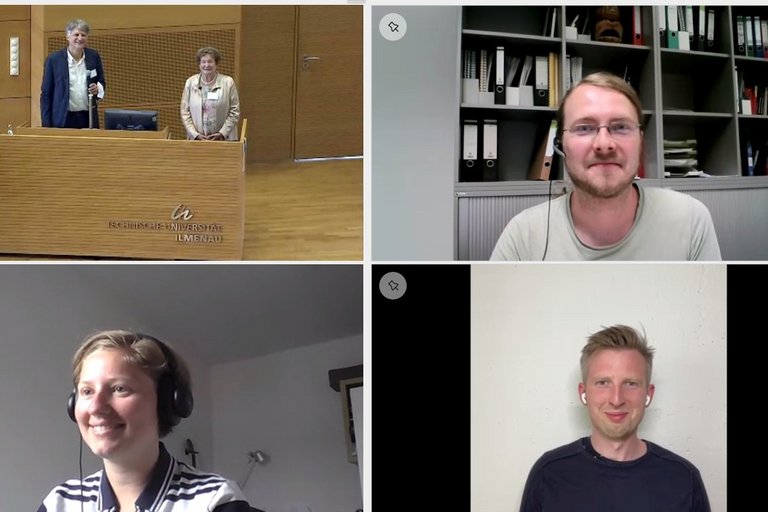
First prize and 250 euros went to Albrecht Schmidt from the Materials Research and Testing Institute at Bauhaus-Universität Weimar for his contribution on the topic of "Uncertainty modeling of a 3D concrete printing process". Steffen Schieler, a doctoral student at the Department of Electronic Measurement and Signal Processing at Ilmenau University of Technology, received the second prize of 150 euros for his contribution "Drone-Shield Research Group". Third place also went to Elisabeth Feldhoff, a young researcher from Ilmenau University of Technology. She received prize money of 100 euros for her contribution "ZO.RRO - Zero Carbon Cross Energy System", which was prepared at the Department of Electrical Power Supply.
In the end, the participants concluded that TU Ilmenau had hosted an all-round successful premiere of the first "Engineering Day". The second edition of the new format for exchange within the Alliance of Thuringian Engineering Sciences is scheduled to take place at Bauhaus University Weimar in 2022.

